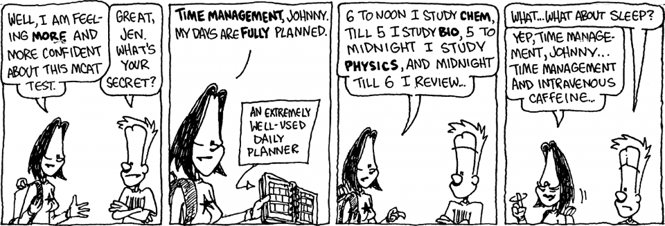
As all pre-med students know, the MCAT is one of the biggest (and sometimes scariest!) hurdles on the way to medical school. It is also steeped in uncertainty -- how do you study? What score should I be aiming towards? When will I be ready to take it?
Generally, students applying to medical schools fall into three camps: 1) Freshmen or sophomores who are certain they want to pursue medicine right after they graduate, and are planning their coursework around senior-year medical school applications, 2) Upperclassmen who are basically done with their prerequisites but want to take a year or two off before their application cycle, and 3) Post-bac students who decided after graduation that medicine was the right path for them, and are now going back and fulfilling leftover requirements. Trying to time the MCAT can be difficult in any situation, so here are some tips and things to think about in each stage.
1) You are a freshman/sophomore intending to apply during your senior year
If you decide early in your college career that you will definitely be applying to medical school, you’re probably already planning out your pre-med prereqs to fit into a balanced schedule. If you’re planning to apply during your senior year, it’s important to remember that applications open in June, but colleges will often ask for you to ‘prepare’ for your application as early as in February.
- When should I take the MCAT?: I would recommend taking it either in the summer after your sophomore year or at the end of winter break (one of the January tests) of your junior year.
- What are the benefits of doing so? Taking it reasonably close to or during a school vacation will allow you some dedicated MCAT study time free from the obligations of your busy college life. Getting scores back early will also give you time to assess the strength of your application and retake the exam if necessary.
- What are the drawbacks? Taking it this early in college might mean that you haven’t completed all of your prerequisite courses yet. I think the most important courses to take before tackling the MCAT are intro-level biology classes, a general chemistry class, and at least one semester of physics. Biochem can also be helpful if you have the space, but orgo is now less of a priority thanks to the new MCAT. The sociology/psychology sections are relatively easy to pick up from scratch, but of course, having some familiarity with the vocabulary can’t hurt.
2) You want to take time off before applying.
If you know you want to take at least a year off between graduation and med school, you have more flexibility with your timing. Still, try to take the exam soon after you finish your prereqs, at a relatively light time in your schedule, for the best chance of success.
- When should I take the MCAT?: I recommend taking it sometime between the summer of your junior year and the winter of your senior year. Be mindful of the stipulations about how long you can use a test score after you take it (three years for the MCAT) -- if you want to take more than two years off, you might want to plan for a later test date.
- What are the benefits of doing so? Again, taking it during a school vacation will allow for dedicated MCAT study time without interruptions from other commitments, and you’ll have some flexibility with building your application and retaking the exam. It also gives you the opportunity to complete all of the required coursework, building a stronger foundation for your studies.
- What are the drawbacks? Applying towards the end of college or after college can be tricky, as you are trying to plan around free time during a job or senior spring(!). Students often think that their coursework and extracurricular activities will be lighter during the spring of their senior year, which may be true, but it’s also a time to enjoy, so think really hard about whether you’ll be able to focus on the MCAT. If you’re planning on taking the exam later, make sure you can devote enough time and resources to studying -- the MCAT is important and you want to do your best!
3) You are finishing up some post-bac prereq classes and preparing your application
If you took another path immediately after college and are coming back to prepare yourself for med school applications, you might be taking some time off to finish your pre-requisites and put together your application. Both your post-bac grades and your MCAT will be important, so don’t compromise one to do well on the other.
- When should I take the MCAT?: Try to schedule your MCAT exam at least a month after you finish your post-bac classes.
- What are the benefits of this? Taking it soon after the close of your prereqs will ensure that the material is fresh in your head, and also give you some time to study exclusively for the MCAT.
- What are the drawbacks? Sometimes, post-bac students can be on a tight schedule to finish their classes and put together an application for their target cycle. If you’re finishing your requirements close to when you’ll be submitting your apps, try to front-load the MCAT-relevant courses (bio, chem, physics) and schedule the exam for a time when you have a lighter load at school.
Each applicant’s circumstance in planning the MCAT is unique, but figuring out when you want to apply, balancing MCAT study time with courses and other commitments, and giving yourself enough time to retake the exam if necessary are crucial for everybody. If you need help setting a study schedule or planning for a test, feel free to reach out to Cambridge Coaching to speak with a tutor!
Comments